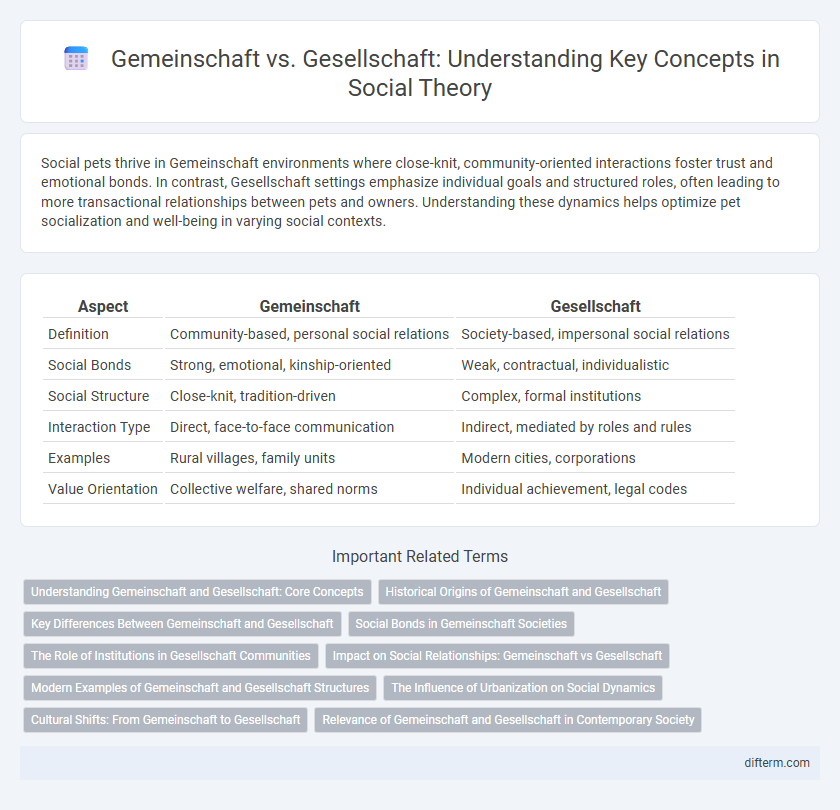Social pets thrive in Gemeinschaft environments where close-knit, community-oriented interactions foster trust and emotional bonds. In contrast, Gesellschaft settings emphasize individual goals and structured roles, often leading to more transactional relationships between pets and owners. Understanding these dynamics helps optimize pet socialization and well-being in varying social contexts.
Table of Comparison
| Aspect | Gemeinschaft | Gesellschaft |
|---|---|---|
| Definition | Community-based, personal social relations | Society-based, impersonal social relations |
| Social Bonds | Strong, emotional, kinship-oriented | Weak, contractual, individualistic |
| Social Structure | Close-knit, tradition-driven | Complex, formal institutions |
| Interaction Type | Direct, face-to-face communication | Indirect, mediated by roles and rules |
| Examples | Rural villages, family units | Modern cities, corporations |
| Value Orientation | Collective welfare, shared norms | Individual achievement, legal codes |
Understanding Gemeinschaft and Gesellschaft: Core Concepts
Gemeinschaft refers to social relations based on close personal bonds, shared values, and community, typically found in rural or traditional societies where relationships are direct and enduring. Gesellschaft, in contrast, describes social associations characterized by impersonal, formal, and contractual relationships common in modern urban settings, prioritizing individual goals over communal ties. Understanding these core concepts reveals how social organization shifts from intimate, collective cohesion to structured, goal-oriented interactions in complex societies.
Historical Origins of Gemeinschaft and Gesellschaft
Gemeinschaft originated from pre-industrial, agrarian societies characterized by close personal relationships, strong family ties, and shared cultural values, fostering a sense of community and collective responsibility. Gesellschaft emerged during industrialization and urbanization phases in 19th-century Western Europe, marked by impersonal, contractual interactions and individualism within capitalist economies. The historical shift from Gemeinschaft to Gesellschaft reflects transformations in social organization driven by economic changes and modernization processes.
Key Differences Between Gemeinschaft and Gesellschaft
Gemeinschaft emphasizes close-knit, personal relationships often found in rural or traditional communities, where social ties are based on kinship, friendship, and shared values. Gesellschaft represents impersonal, formal associations typical of urban life, where interactions are guided by individual self-interest, contractual obligations, and bureaucratic structures. The key difference lies in Gemeinschaft's focus on collective well-being and emotional bonds versus Gesellschaft's emphasis on individualism and rational cooperation.
Social Bonds in Gemeinschaft Societies
Gemeinschaft societies are characterized by strong social bonds rooted in kinship, tradition, and community, fostering deep interpersonal relationships and mutual support. These bonds create a sense of belonging and collective identity, which are fundamental for social cohesion and cooperation. Unlike Gesellschaft societies that emphasize individualism and formal contracts, Gemeinschaft communities prioritize shared values and emotional connections.
The Role of Institutions in Gesellschaft Communities
In Gesellschaft communities, institutions play a crucial role in structuring social interactions through formal rules, laws, and bureaucratic systems designed to maintain order and efficiency. Unlike Gemeinschaft, which relies on personal bonds and shared values, Gesellschaft depends on impersonal institutions such as governments, legal systems, and corporations to regulate relationships and facilitate cooperation among diverse individuals. These institutions enable complex urban societies to function by providing stability, predictability, and governance in large-scale social environments.
Impact on Social Relationships: Gemeinschaft vs Gesellschaft
Gemeinschaft fosters close-knit, personal social relationships rooted in shared values, traditions, and emotional connections typical of rural or community-based settings. Gesellschaft emphasizes impersonal, formal, and goal-oriented relationships often seen in urban or industrial societies, prioritizing efficiency and individualism. The impact on social relationships is profound, with Gemeinschaft promoting social cohesion and mutual support, whereas Gesellschaft encourages social mobility but can lead to alienation and weaker social bonds.
Modern Examples of Gemeinschaft and Gesellschaft Structures
Gemeinschaft manifests in modern small, tight-knit communities such as rural villages or close urban neighborhoods where personal relationships, tradition, and mutual support dominate daily interactions. Gesellschaft is evident in large corporations and urban cities where impersonal, formal, and transactional relationships prioritize efficiency, specialization, and individual goals over communal bonds. The rise of digital platforms and remote work environments often blurs traditional distinctions by combining Gemeinschaft-like social networks with Gesellschaft's structural organization.
The Influence of Urbanization on Social Dynamics
Urbanization accelerates the shift from Gemeinschaft, characterized by close-knit, personal relationships, to Gesellschaft, defined by impersonal, formal associations typical of modern cities. This transformation impacts social dynamics by fostering greater individualism, weakening traditional community bonds, and increasing social diversity and complexity in urban environments. As a result, urban settings prioritize efficiency, specialization, and contractual interactions over emotional and communal ties found in rural contexts.
Cultural Shifts: From Gemeinschaft to Gesellschaft
Cultural shifts from Gemeinschaft to Gesellschaft reflect a transition from close-knit, community-oriented social structures to more impersonal, individualistic societies characterized by formal relationships and contractual interactions. This transformation highlights the rise of urbanization, industrialization, and modernity, which prioritize efficiency, specialization, and self-interest over traditional bonds and collective values. As a result, social cohesion increasingly depends on legal systems, institutions, and economic exchanges rather than shared customs and emotional ties.
Relevance of Gemeinschaft and Gesellschaft in Contemporary Society
Gemeinschaft represents intimate, community-oriented social ties rooted in shared values and close relationships, crucial for fostering social cohesion and emotional support in contemporary society. Gesellschaft embodies impersonal, formal associations typical of modern urban life, emphasizing efficiency, individualism, and contractual interactions essential in globalized economies and complex social structures. Both concepts remain relevant as they illustrate the balance between personal connections and functional social organization necessary for navigating modern societal challenges.
Gemeinschaft vs Gesellschaft Infographic

 difterm.com
difterm.com